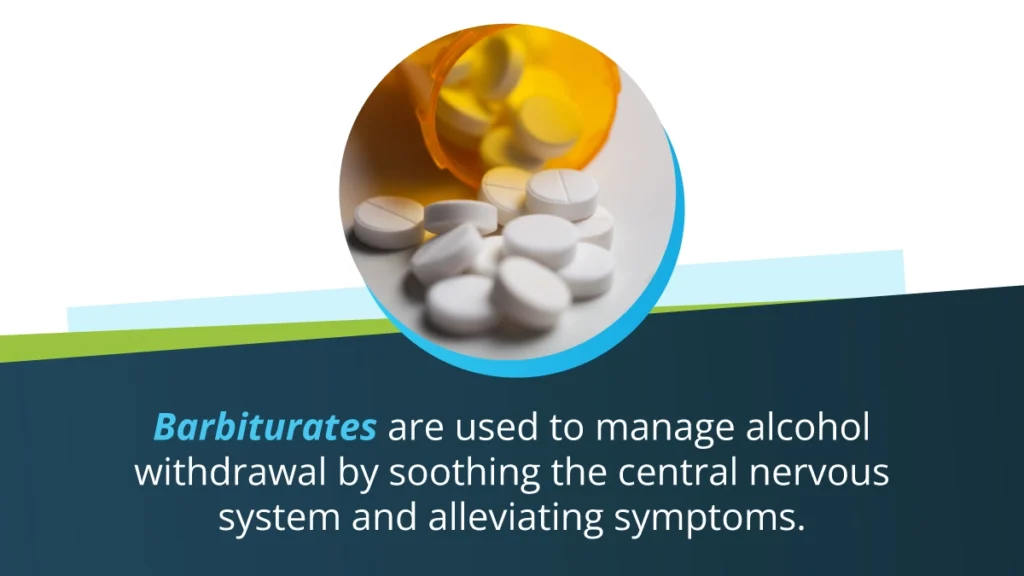Barbiturates have long been used to manage alcohol withdrawal symptoms. These medications help reduce the intense effects of withdrawal by calming the central nervous system, and understanding how barbiturates work can provide crucial insights into their role in easing this challenging process.
When used correctly, barbiturates can make the withdrawal experience more manageable. They help stabilize mood and prevent severe complications. This blog will explore how barbiturates assist in alcohol detoxification and their potential benefits and risks.
Key Takeaways
Alcohol withdrawal is the discomfort and symptoms that arise when alcohol consumption is suddenly reduced. Here’s what you should know:
- Barbiturates help manage alcohol withdrawal by calming the central nervous system and reducing withdrawal symptoms.
- Clinical guidelines recommend using barbiturates for alcohol withdrawal to ensure safe and effective symptom management.
- Barbiturates are effective for managing alcohol withdrawal symptoms, but they also come with potential side effects to consider.
The Haven Detox-New Jersey offers various services to help you recover from alcoholism and withdrawal. Call us at (856) 565-3102 for details.

Overview Of Alcohol Withdrawal
Alcohol withdrawal occurs when someone suddenly stops drinking after heavy use. The body becomes dependent on alcohol, and without it, symptoms can appear. Common symptoms include shaking, sweating, and anxiety. These symptoms can start within hours of stopping and may last for days.
Severe withdrawal symptoms, such as hallucinations or seizures, may also happen. This more intense form of withdrawal is known as delirium tremens (DT) and can be dangerous. It’s essential to seek medical help if experiencing severe symptoms. Doctors can provide treatments to ease these symptoms and prevent complications.
Treatment usually involves medical supervision and possibly medication to manage symptoms. Gradual reduction of alcohol intake may also be recommended. This approach helps the body adjust slowly and reduces the risk of severe withdrawal symptoms. Recovery can be supported by medical and emotional care throughout the process.
Treatment Options For Alcohol Withdrawal
Alcohol withdrawal syndrome (AWS) can present severe symptoms that require immediate medical attention. Traditional treatment options are crucial in managing these symptoms effectively. Medical professionals often use a combination of drugs tailored to each patient’s needs. Understanding these options helps in selecting the best course of action for recovery.
Benzodiazepines
Benzodiazepines are first-line treatments for alcohol withdrawal syndrome (AWS). They help manage severe symptoms like insomnia and agitation. Doctors adjust the dose based on the patient’s condition. Medical professionals use these drugs to reduce the risk of complications, especially in critical care settings.
Anticonvulsants
Anticonvulsants treat alcohol withdrawal symptoms, particularly in patients with seizures. These drugs stabilize the brain’s electrical activity, reducing severe cases of AWS. Studies show they can be effective when benzodiazepines aren’t suitable. They help manage symptoms and lower the risk of complications during withdrawal.
Beta-Blockers
Beta-blockers help manage heart rate and anxiety in alcohol withdrawal syndrome. They treat symptoms like high blood pressure and rapid heart rate. These drugs can be part of a broader treatment plan, especially in severe cases where alcohol use disorder is a concern.
Barbiturates In Alcohol Withdrawal
Barbiturates were once commonly used to manage severe alcohol withdrawal symptoms. These drugs play a crucial role in the treatment of alcohol abuse by affecting the brain’s neurotransmitters. However, their use has become less common due to safety concerns and the development of newer medications.
Historical Context
Barbiturates like phenobarbital were used to treat severe alcohol withdrawal. Historically, they were a standard first-line treatment in the United States. However, their use declined due to risk factors and side effects. Their effectiveness in reducing symptoms of alcohol withdrawal was initially significant.
Mechanism Of Action
Barbiturates act by enhancing the sedative effect on GABA receptors in the brain. They increase neurotransmitter activity, which helps manage symptoms of alcohol withdrawal. The drugs impact the central nervous system, making them effective for severe cases. However, their long half-life can lead to complications.
Comparison With Benzodiazepines
Benzodiazepines are now preferred over barbiturates for alcohol withdrawal. They are generally safer and have a better side effect profile. Benzodiazepines also work by affecting GABA receptors but with fewer risks. They are the first-line treatment for severe alcohol withdrawal syndrome today.
Clinical Guidelines For Barbiturate Use
Barbiturates play a critical role in managing severe alcohol withdrawal symptoms. These guidelines offer essential information for emergencies and intensive care settings. They help healthcare professionals ensure safe and effective treatment for people facing severe alcohol withdrawal and related medical emergencies.
Indications For Use
Barbiturates are used in the medical emergency department for treating alcohol withdrawal. They help manage severe symptoms when other treatments fail. This approach is crucial for people with substance abuse issues and medical conditions that worsen withdrawal symptoms. The primary outcome is to stabilize the patient effectively.
Dosage And Administration
For alcohol withdrawal, the use of phenobarbital monotherapy dosage is carefully determined in the intensive care unit. The treatment center sets doses based on patient response and medical conditions. Adjustments are made to avoid side effects, including respiratory depression. Proper administration ensures effective alcohol withdrawal treatment.
Monitoring And Safety Protocols
Monitoring during phenobarbital use includes tracking vital signs and withdrawal symptoms. Safety protocols focus on preventing respiratory depression and ensuring effective treatment of alcohol withdrawal. In addition, regular assessments in emergency settings help adjust treatment plans. Ensuring safety and effectiveness is vital for successful alcohol withdrawal management.
Benefits Of Barbiturate Use
Barbiturates can offer significant benefits when used appropriately. They help manage severe symptoms and reduce risks in specific medical situations. While effective, they require careful supervision due to potential side effects and dependency issues. Understanding their benefits helps in making informed treatment decisions.
Rapid Symptom Control
Barbiturates provide quick relief for acute symptoms. They act fast to calm intense reactions, making them useful in emergencies. This rapid action helps stabilize patients when other treatments might take longer. Proper use ensures immediate symptom control, which is crucial for patient comfort.
Reduction In Seizure Risk
Barbiturates are effective in lowering the risk of seizures. They help prevent seizure activity by stabilizing brain function, making them valuable in treating certain neurological conditions. Regular monitoring ensures that the dosage is effective and safe for reducing seizure risks.
Detoxification Stabilization
Barbiturates assist in stabilizing patients during detoxification. They can ease withdrawal symptoms and provide stability as the body clears substances. This makes the detox process more manageable and reduces discomfort. Proper use during detox helps patients transition more smoothly to recovery.
Side Effects Of Barbiturate Use
Barbiturates are a class of drugs that can cause various side effects, especially during alcohol withdrawal. One common effect is drowsiness, which can make daily activities challenging and impact overall alertness. Users may also experience confusion or memory problems, making focusing or performing tasks harder.
Another side effect of barbiturate use is respiratory depression, where breathing slows down significantly. This can lead to decreased oxygen levels, causing shortness of breath or dizziness. In severe cases, it might even result in more serious health complications that require immediate medical attention.
Barbiturates can also affect mood and behavior, leading to increased irritability or mood swings. These changes can strain personal relationships and cause emotional distress. Overall, while barbiturates might help with withdrawal symptoms, their side effects can significantly impact both physical and mental health.
Frequently Asked Questions (FAQs)
What are the three medications used to treat alcoholism?
Three common medications used to treat alcoholism are disulfiram, naltrexone, and acamprosate. Disulfiram works by causing unpleasant reactions if alcohol is consumed, which helps deter drinking. Naltrexone reduces cravings for alcohol by blocking its effects on the brain.
Acamprosate helps restore balance in brain chemicals, reducing the urge to drink. Each medication has a specific role in treating alcoholism, and doctors choose based on individual needs. These medications are most effective when combined with counseling and support. Always consult a healthcare professional to find the best treatment option.
Can barbiturates be used in combination with other medications for alcohol withdrawal treatment?
Barbiturates can be used to manage alcohol withdrawal, but they are not commonly used today. They are sedatives that help calm the nervous system during withdrawal. However, due to their high potential for addiction and overdose, doctors prefer safer alternatives like benzodiazepines.
When barbiturates are used, they are carefully combined with other medications to ensure safety. Medical professionals closely monitor the patient to adjust dosages and prevent adverse effects. Combining medications for alcohol withdrawal is complex and should only be done under strict medical supervision. Always consult a healthcare provider for personalized treatment options and guidance.
How can someone safely stop taking barbiturates?
To safely stop taking barbiturates, follow these steps. First, consult a doctor for a safe tapering plan. Gradually reduce the dose under medical supervision to avoid withdrawal symptoms. Avoid stopping suddenly, as it can lead to serious health issues. Your doctor may suggest alternative medications or therapies to manage withdrawal effects.
Regular follow-ups with your healthcare provider are essential to monitor progress and adjust the plan. Support from a counselor or support group can also help during this process. Remember, a gradual and supervised approach is crucial for a safe transition off barbiturates.
Embrace Sobriety At The Haven Detox-New Jersey
Managing alcohol withdrawal can be challenging, but you don’t have to navigate it alone. At The Haven Detox-New Jersey, we offer personalized treatment plans to support your recovery journey.
Our drug and alcohol detox services provide a safe and supervised environment to manage withdrawal symptoms. We offer residential rehab to provide comprehensive care in a supportive setting to help you build a strong foundation for recovery.
Our IV therapy services deliver essential nutrients to aid your body’s healing process during detox. Our compassionate and experienced team is dedicated to providing personalized care and support, ensuring your journey to recovery is as smooth and effective as possible.
Contact us today at (856) 565-3102 to discover how we can help you embrace a healthier, sober future.

